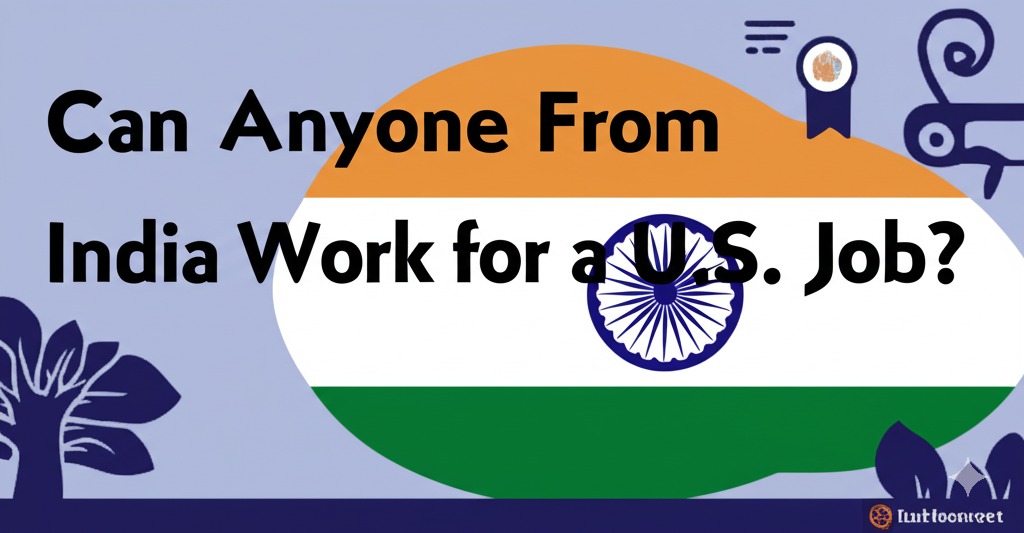
In today’s interconnected world, the concept of international employment has gained immense popularity, with people from all corners of the globe pursuing opportunities in different countries. One of the most common questions that arise is whether individuals from India can work for companies based in the United States. If you’re in India and wondering about securing a job with a U.S. employer, you’re not alone. This article will explore everything you need to know about working for a U.S. job from India, including the legal processes, the skills in demand, and practical tips to help you get started.
Why Work for a U.S. Company from India?
Before diving into the logistics, it’s important to understand why many Indians seek U.S. job opportunities. The United States is home to some of the world’s largest and most influential companies, offering highly competitive salaries, career advancement, and access to cutting-edge technologies. Moreover, working for a U.S. employer often provides global exposure, helping professionals gain experience that’s highly valued worldwide.
For many, remote work options make this even more attractive, especially after the global shift to flexible working conditions post-2020. With the right skills and determination, the opportunity to work remotely for a U.S. company has never been easier.
Legalities and Work Visas: What You Need to Know
1. Remote Work vs. In-Person Jobs
If you’re applying for a remote job with a U.S. company while based in India, you generally don’t need a work visa. However, the legalities differ if the job requires you to physically relocate to the U.S.
- Remote Jobs: In most cases, U.S. companies hiring remote workers in India don’t require a work visa. However, you should be aware of tax regulations in both India and the U.S. to ensure compliance.
- In-Person Jobs: For those looking to physically move to the U.S. for work, a work visa like the H-1B or L-1 is necessary. These visas allow foreign workers to temporarily live and work in the United States. Companies that sponsor H-1B visas typically look for specialized professionals in fields such as technology, engineering, healthcare, and finance.
2. Legal Contracts and Employment Laws
When working remotely for a U.S. company, it’s important to understand the terms of your employment contract. U.S. labor laws may differ significantly from Indian labor laws, especially concerning benefits, working hours, and dispute resolution. It’s advisable to consult a legal expert to ensure your rights are well-protected.
Skills in Demand for Remote U.S. Jobs
To successfully land a remote job with a U.S. employer, you need to have the right skill set. Many fields are open to international remote workers, but there are certain areas where demand is particularly high.
1. Technology & Software Development
The tech industry is booming in the U.S., and software developers, data scientists, and IT professionals are in high demand. Programming languages like Python, JavaScript, and Java, along with knowledge of frameworks such as React or Node.js, can set you apart from other applicants.
2. Digital Marketing
With the rise of digital media, businesses across the U.S. are constantly seeking experts in search engine optimization (SEO), social media marketing, content writing, and pay-per-click (PPC) advertising.
3. Customer Support and Virtual Assistance
Many U.S. companies require remote workers for customer service or administrative support roles. Fluency in English, excellent communication skills, and proficiency in tools like Zendesk or Slack can be valuable assets.
4. Graphic Design and Multimedia Production
As businesses aim to stand out in a crowded market, high-quality design work becomes increasingly important. If you have experience in graphic design, video editing, or multimedia production, there are many opportunities available to work remotely for U.S. companies.
How to Apply for U.S. Jobs from India: A Step-by-Step Guide
Step 1: Update Your Resume and Online Profiles
To stand out in a competitive job market, it’s essential to create a professional resume that highlights your skills, experience, and achievements. Additionally, having an updated LinkedIn profile can help you gain visibility and connect with U.S. employers.
Step 2: Job Search Platforms
Use popular job search platforms like LinkedIn, Indeed, and Glassdoor to find remote U.S. job listings. Websites like We Work Remotely, Remote.co, and AngelList specialize in listing remote jobs from companies worldwide, including the U.S.
Step 3: Tailor Your Application
When applying for remote jobs, tailor your resume and cover letter to the specific job posting. Highlight your experience working remotely, if applicable, and demonstrate your ability to work independently, manage time effectively, and communicate across time zones.
Step 4: Prepare for Remote Interviews
Be prepared for virtual interviews. Ensure that your internet connection is stable, and your camera and microphone are working well. Since you’ll likely be interviewed online, practice speaking clearly and professionally to make a strong impression.
Challenges of Working for a U.S. Job from India
While there are many benefits to working remotely for a U.S. company, there are some challenges that you should be aware of.
1. Time Zone Differences
Working remotely from India for a U.S. company often means adjusting to a significant time difference. Depending on the time zone of your employer, you may need to work late nights or early mornings. It’s important to set boundaries and communicate your availability clearly with your employer.
2. Cultural Differences
Understanding U.S. workplace culture is key to building strong relationships with colleagues and employers. Although the work environment may be different, adapting to the cultural norms, communication styles, and expectations can make your remote job experience smoother.
3. Payment and Taxation
When working remotely for a U.S. company, you’ll likely be paid in U.S. dollars. This may involve navigating exchange rates, international banking fees, and tax obligations in both India and the U.S. It’s important to have a clear understanding of how payments will be processed and to consult a tax professional for advice.
Conclusion: Start Your Remote Journey Today
In conclusion, it is absolutely possible for someone in India to work for a U.S. company, whether remotely or through physical relocation. With the right skills, a solid application strategy, and an understanding of the legal and cultural aspects, you can embark on a fulfilling career with a U.S. employer. Remote work has opened up a world of opportunities, allowing professionals to connect with global companies from the comfort of their homes.

Andre Cuevas provides career insights, job search strategies, and professional advice to help individuals navigate the job market and achieve their career goals.





